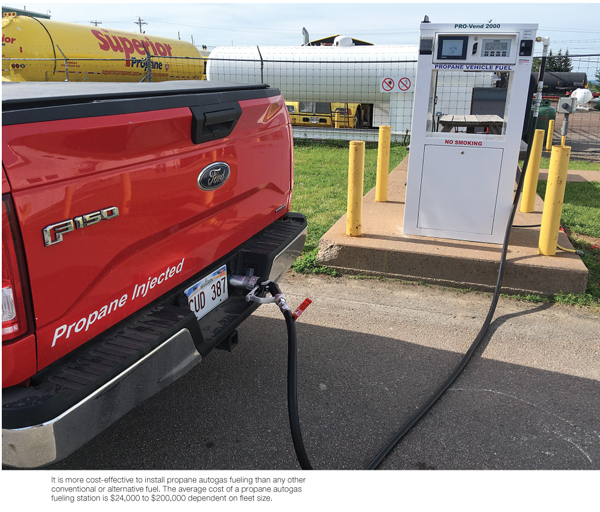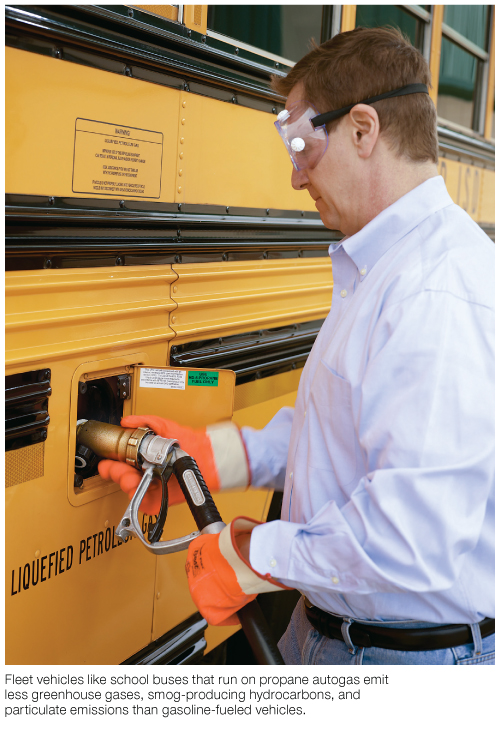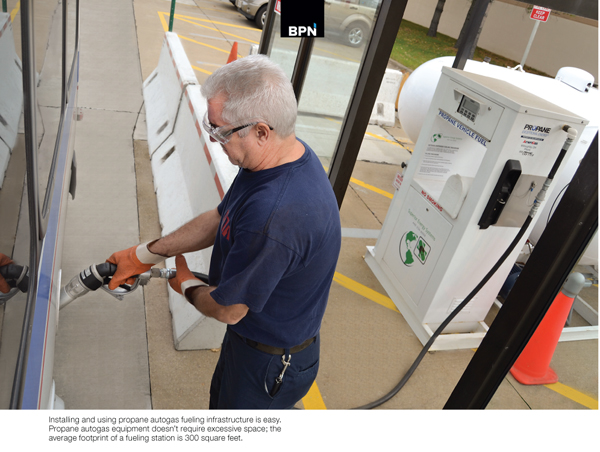Tuesday, April 30, 2019
By Todd Mouw and Jim Bunsey…Propane providers across the nation can bring in propane autogas fleet customers that account for steady, year-round gallons.

Every day, you drive around the city or town you live in. By paying attention to the service and fleet vehicles you see, you can learn a lot about which fleets would consider propane autogas vehicles if they knew about the benefits. Spot a pest control company. What type of vehicle is it? Does an EPA/CARB certification exist for that vehicle system to operate on propane autogas? Check out the back of school buses and look for the diamonds denoting fuel type. Are they running on diesel or another alternative fuel? See a city or county vehicle? How far do you think they are driving every day? Research the fleets in your area and whether they are considering a shift to alternative fuels.
FACE TO FACE
Key company decision makers need to be aware of propane autogas vehicles and infrastructure options. When it comes to fueling, you are the expert! How can you get their attention most effectively?
A sit-down meeting and presentation can be a great way to introduce options. Many valuable resources from the Propane Education & Research Council Product Catalog, including video case studies and cut-sheets, are at your fingertips to download and share. Inviting other industry experts will help you be better prepared to answer any and all questions, too. For example, propane fuel system providers, like Superior Energy Systems, are available to help you with costs associated with fueling equipment and installation information. Propane autogas fuel system manufacturers, such as ROUSH CleanTech, can speak to the types of commercial vehicles available with propane systems. Other options include inviting the fleet customer to tour your facility, especially if you have on-site propane autogas fueling, or tour the facility of a fleet customer you currently serve.
BACK TO BASICS MESSAGING
You have likely heard the phrase “propane autogas” for several years now, along with the key benefits of why it is such an ideal solution for fleets. The most important thing to remember is that the fleets you are approaching have very likely not heard about propane autogas. Start from the beginning.
Three key messages about propane as a transportation fuel are:
No. 1 — IT'S ECONOMICAL
Propane autogas generally costs up to 40% less than gasoline and up to 50% less than diesel. In addition to the fuel cost savings, propane autogas burns cleaner in engines than gasoline and diesel, which results in reduced maintenance costs and potential for longer engine life. Engines fueled by propane autogas require less oil by volume than diesel and no additional diesel emission fluids or extra valve adjustments. Customers report less servicing needed for fluids, coolants, and filters.
No. 2 — IT'S EASIER ON THE ENVIRONMENT
Fleet vehicles that run on propane autogas emit fewer greenhouse gases, smog-producing hydrocarbons, and particulate emissions than gasoline-fueled vehicles. When compared to diesel, propane autogas vehicles emit fewer nitrogen oxides, greenhouse gases, and virtually eliminate particulate matter. Ford Class 4-7 vehicles equipped with a ROUSH CleanTech fuel system are 75% cleaner than the current federal emissions standard for nitrogen oxides—and 99% cleaner than diesel vehicles built before 2007.

No. 3 — IT'S SAFE AND WIDESPREAD
Propane autogas is the third most commonly used transportation fuel across the U.S. and the globe (behind gasoline and diesel). Propane autogas vehicles operate about 50% more quietly, which increases safety and decreases driver fatigue. Propane autogas is a nontoxic, noncarcinogenic, and noncorrosive fuel.
Next, review the basics around fueling. Three key messages about propane autogas fueling are:

No. 1 — IT'S COST EFFECTIVE
It is more cost-effective to install propane autogas fueling than any other conventional or alternative fuel. The average cost of a propane autogas fueling station is $24,000 to $200,000 dependent on fleet size.
There are three main options for installing propane autogas infrastructure:
• The fleet purchases and owns the equipment, as well as maintains it, and the fuel provider supplies fuel for an agreed upon price and time period (usually by bid).
• The fleet agrees to a “lease to own” structure with their fuel provider for an agreed upon price and time period at cost-plus (cost is built into the price per gallon).
• The fuel provider installs the equipment for the fleet and fully maintains it, in exchange for a three- to five-year fueling contract at cost-plus.
No. 2 — IT'S EASY TO USE
Installing and using propane autogas fueling infrastructure is easy. Propane autogas equipment doesn’t require excessive space; the average footprint of a fueling station is 300 square feet.
Propane autogas dispensing is a closed-loop system and new technology allows for almost zero fugitive emissions.
No. 3 — IT'S INTELLIGENT
Some propane autogas dispensers are fully integrated and customizable web-based units. These dispensers track key data like driver and vehicle identification, vehicle mileage, and gallons pumped for a virtually unlimited number of vehicles, drivers, and customers. You can access all fleet information in real time and create customizable reports, without the need to purchase and install separate technology.
FOLLOW UP
In the weeks and months after your presentation at a customer site, be sure to follow up. Ask specifically for updates about where the prospect’s decision-making process is and help to answer questions. Remember to provide updated information on technology and fleets transitioning to propane autogas.
Be sure to track every conversation in your customer relationship management software. If your company doesn’t have a CRM, simply use an Excel spreadsheet.
Once you take notice of the businesses around you, you’ll be sure to find fleet customers interested in propane autogas.
Todd Mouw is president of ROUSH CleanTech, manufacturer of propane autogas fuel systems for fleet vehicles, based in Livonia, Mich. Jim Bunsey is director of operations for Superior Energy Systems, manufacturer of propane autogas dispensers, based in Columbia Station, Ohio.

Every day, you drive around the city or town you live in. By paying attention to the service and fleet vehicles you see, you can learn a lot about which fleets would consider propane autogas vehicles if they knew about the benefits. Spot a pest control company. What type of vehicle is it? Does an EPA/CARB certification exist for that vehicle system to operate on propane autogas? Check out the back of school buses and look for the diamonds denoting fuel type. Are they running on diesel or another alternative fuel? See a city or county vehicle? How far do you think they are driving every day? Research the fleets in your area and whether they are considering a shift to alternative fuels.
FACE TO FACE
Key company decision makers need to be aware of propane autogas vehicles and infrastructure options. When it comes to fueling, you are the expert! How can you get their attention most effectively?
A sit-down meeting and presentation can be a great way to introduce options. Many valuable resources from the Propane Education & Research Council Product Catalog, including video case studies and cut-sheets, are at your fingertips to download and share. Inviting other industry experts will help you be better prepared to answer any and all questions, too. For example, propane fuel system providers, like Superior Energy Systems, are available to help you with costs associated with fueling equipment and installation information. Propane autogas fuel system manufacturers, such as ROUSH CleanTech, can speak to the types of commercial vehicles available with propane systems. Other options include inviting the fleet customer to tour your facility, especially if you have on-site propane autogas fueling, or tour the facility of a fleet customer you currently serve.
BACK TO BASICS MESSAGING
You have likely heard the phrase “propane autogas” for several years now, along with the key benefits of why it is such an ideal solution for fleets. The most important thing to remember is that the fleets you are approaching have very likely not heard about propane autogas. Start from the beginning.
Three key messages about propane as a transportation fuel are:
No. 1 — IT'S ECONOMICAL
Propane autogas generally costs up to 40% less than gasoline and up to 50% less than diesel. In addition to the fuel cost savings, propane autogas burns cleaner in engines than gasoline and diesel, which results in reduced maintenance costs and potential for longer engine life. Engines fueled by propane autogas require less oil by volume than diesel and no additional diesel emission fluids or extra valve adjustments. Customers report less servicing needed for fluids, coolants, and filters.
No. 2 — IT'S EASIER ON THE ENVIRONMENT
Fleet vehicles that run on propane autogas emit fewer greenhouse gases, smog-producing hydrocarbons, and particulate emissions than gasoline-fueled vehicles. When compared to diesel, propane autogas vehicles emit fewer nitrogen oxides, greenhouse gases, and virtually eliminate particulate matter. Ford Class 4-7 vehicles equipped with a ROUSH CleanTech fuel system are 75% cleaner than the current federal emissions standard for nitrogen oxides—and 99% cleaner than diesel vehicles built before 2007.

No. 3 — IT'S SAFE AND WIDESPREAD
Propane autogas is the third most commonly used transportation fuel across the U.S. and the globe (behind gasoline and diesel). Propane autogas vehicles operate about 50% more quietly, which increases safety and decreases driver fatigue. Propane autogas is a nontoxic, noncarcinogenic, and noncorrosive fuel.
Next, review the basics around fueling. Three key messages about propane autogas fueling are:

No. 1 — IT'S COST EFFECTIVE
It is more cost-effective to install propane autogas fueling than any other conventional or alternative fuel. The average cost of a propane autogas fueling station is $24,000 to $200,000 dependent on fleet size.
There are three main options for installing propane autogas infrastructure:
• The fleet purchases and owns the equipment, as well as maintains it, and the fuel provider supplies fuel for an agreed upon price and time period (usually by bid).
• The fleet agrees to a “lease to own” structure with their fuel provider for an agreed upon price and time period at cost-plus (cost is built into the price per gallon).
• The fuel provider installs the equipment for the fleet and fully maintains it, in exchange for a three- to five-year fueling contract at cost-plus.
No. 2 — IT'S EASY TO USE
Installing and using propane autogas fueling infrastructure is easy. Propane autogas equipment doesn’t require excessive space; the average footprint of a fueling station is 300 square feet.
Propane autogas dispensing is a closed-loop system and new technology allows for almost zero fugitive emissions.
No. 3 — IT'S INTELLIGENT
Some propane autogas dispensers are fully integrated and customizable web-based units. These dispensers track key data like driver and vehicle identification, vehicle mileage, and gallons pumped for a virtually unlimited number of vehicles, drivers, and customers. You can access all fleet information in real time and create customizable reports, without the need to purchase and install separate technology.
FOLLOW UP
In the weeks and months after your presentation at a customer site, be sure to follow up. Ask specifically for updates about where the prospect’s decision-making process is and help to answer questions. Remember to provide updated information on technology and fleets transitioning to propane autogas.
Be sure to track every conversation in your customer relationship management software. If your company doesn’t have a CRM, simply use an Excel spreadsheet.
Once you take notice of the businesses around you, you’ll be sure to find fleet customers interested in propane autogas.
Todd Mouw is president of ROUSH CleanTech, manufacturer of propane autogas fuel systems for fleet vehicles, based in Livonia, Mich. Jim Bunsey is director of operations for Superior Energy Systems, manufacturer of propane autogas dispensers, based in Columbia Station, Ohio.



